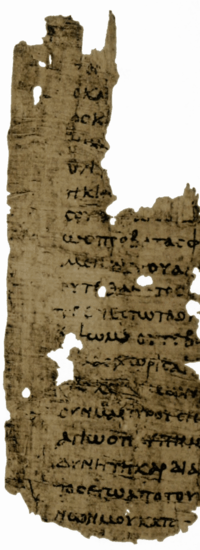Romans 12
| Romans 12 | |
|---|---|
|
Epistle to the Romans 8:12-22 in the bigger of two fragments forming Papyrus 27 (recto side), written in the 3rd century. | |
| Book | Epistle to the Romans |
| Bible part | New Testament |
| Order in the Bible part | 6 |
| Category | Pauline epistles |
Romans 12 is the twelfth chapter of the Epistle to the Romans in the New Testament of the Christian Bible. It is authored by Paul the Apostle, but written by an amanuensis, Tertius of Iconium, while Paul was in Corinth, in winter of AD 57-58.[1] Paul wrote to the Roman Christians in order to give them a substantial resume of his theology.[2]
Text
- The original text is written in Koine Greek.
- Some most ancient manuscripts containing this chapter are:
- Codex Vaticanus (AD 325-350)
- Codex Sinaiticus (AD 330-360)
- Codex Alexandrinus (ca. AD 400-440)
- This chapter is divided into 21 verses.
Structure
The New King James Version organises this chapter as follows:
- Romans 12:1-2 = Living Sacrifices to God
- Romans 12:3-8 = Serve God with Spiritual Gifts
- Romans 12:9-21 = Behave Like a Christian (Love in Action in the New International Version)
Cross references
A living sacrifice
- I beseech you therefore, brethren, by the mercies of God, that you present your bodies a living sacrifice, holy, acceptable to God, which is your reasonable service (Romans 12:1).
The first letter of Peter uses a similar expressions:
- You also, as living stones, are being built up a spiritual house, a holy priesthood, to offer up spiritual sacrifices acceptable to God through Jesus Christ (1 Peter 2:5).
Paul speaks of "reasonable service (worship)", (Greek: τὴν λογικὴν λατρείαν, tēn logikēn latreian) in contrast to the Greek: λατρεια (latreia, worship) which formed part of the Jewish covenant with God (Romans 9:4). Lutheran theologian Johann Albrecht Bengel summarises the contrasts to which Paul refers:
- The service [worship], λατρέια, of the Gentiles is unreasonable, ἄλογος, (cf. Romans 1:18-25), the confidence of the Jews is unreasonable, ἄλογος, Romans 2:3), but the Christian considers all things rightly, and collects [infers] his duty from the kindness of a merciful God. The epithet λογικὴν now corresponds to that verb, λογίζεσθαι, which is often used (Romans 3:28, 6:11 and 8:18).[3]
Verse 2
- And do not be conformed to this world, but be transformed by the renewing of your mind, that you may prove what is that good and acceptable and perfect will of God.[4]
Verse 3
- For I say, through the grace given to me, to everyone who is among you, not to think of himself more highly than he ought to think, but to think soberly, as God has dealt to each one a measure of faith.[5]
Verse 5
Verses 9-21
Described by Moo as "Love and its manifestations", the section is proverbial in tone, the style is known as parenesis. Some verses echo the Old Testament, notably 16c, 19c, and 20, while others are reflections of Jesus' teachings (especially 14, 17, 18 and 21).[7]
Love in Action
William Barclay suggests that in verses 9 to 13, "Paul presents his people with [twelve] telegraphic rules for everyday life".[8]
Verses 17-21
These verses form a chiasm, bracketed by lines containing the word "evil" - v 17a and v 21. The next layer comprising v 17b-18 and v 20, deals with the way to treat non-Christians. The central portion is the prohibition of vengeance.[7]
Vengeance is mine
Part of this verse - "I will repay" or in older translations "vengeance is mine" (Vengeance is mine, and recompense ESV) - is a quotation from Deuteronomy 32:35. Paul's instruction here is not to be vengeful. John Wycliffe and his colleagues translated as "not defending yourselves" (Romans 12:19
Verse 21
- Do not be overcome by evil, but overcome evil with good.[9]
See also
- Spiritual gift
- Other related Bible parts: Deuteronomy 32, Proverbs 25
References
- ↑ Halley, Henry H. Halley's Bible Handbook: an Abbreviated Bible Commentary. 23rd edition. Zondervan Publishing House. 1962.
- ↑ Holman Illustrated Bible Handbook. Holman Bible Publishers, Nashville, Tennessee. 2012.
- ↑ Bengel's Gnomon on Romans 12, accessed 28 September 2016
- ↑ Romans 12:2
- ↑ Romans 12:3
- ↑ Romans 12:5
- 1 2 Douglas J. Moo (1996). The Epistle to the Romans. The New International Commentary on the New Testament. Frederick Fyvie Bruce (series editor). Wm. B. Eerdmans Publishing. p. 769-773. ISBN 9780802823175.
- ↑ Barclay, W., (1975), The Daily Study Bible Series, Revised Edition: The Letter to the Romans, accessed 27 September 2016
- ↑ Romans 12:21
